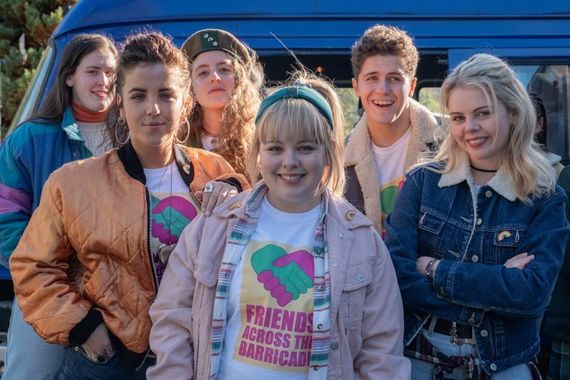Lisa McGee, the creator of the hit series "Derry Girls," has won the 28th Christopher Ewart-Biggs Memorial Prize, recognizing her work in promoting peace and reconciliation and a better understanding between the people of Ireland and the UK.
McGee, a native of Derry, accepted the 2022-2023 Christopher Ewart-Biggs Memorial Prize on Tuesday, February 27 during a reception at the Irish Embassy in London. Irish actor Adrian Dunbar presented McGee with the prize.
“Who could have imagined that a sitcom about four working-class schoolgirls from Derry - and one wee English fella - would be the recipients of such a prestigious award," McGee said while accepting the prize on Tuesday.
"Growing up, I sensed I was from a complicated place but I also knew we were so much more than the image that was so often reflected back at us.
"We were a place full of color and character and joy. We were generous people and we are, in my opinion, the best storytellers in the world.
"All we wanted to do was put that on screen, and we also wanted to make people laugh.
"Laughter is so powerful, it helps us through the toughest of challenges. That's why I believe comedy is so important and so valuable and I'm very proud to be standing here accepting this award as a comedy writer.
"'Derry Girls,' like the Ewart-Biggs Memorial, is really about finding light in the darkness.
"It was a privilege to write this show, it is a privilege to accept this award. It means the world to me and to the 'Derry Girls' team but more importantly, it is something that has finally impressed my parents."
Derry Girls creator and writer Lisa McGee has won the 28th Christopher Ewart-Biggs Memorial Prize, which recognises work promoting peace and reconciliation and a greater understanding between the peoples of Britain and Ireland | Read more: https://t.co/tWVN9WYrZb pic.twitter.com/0uYr3ID8S0
— RTÉ News (@rtenews) February 27, 2024
The objective of the Christopher Ewart-Biggs Memorial Prize, worth £7,500, is to "recognize work that promotes and encourages peace and reconciliation in Ireland, a greater understanding between the peoples of Britain and Ireland, or closer co-operation between the partners of the European Community."
This award was founded in memory of Ewart-Biggs, who was a British Ambassador murdered by the Irish Republican Army (IRA) in 1976.
McGee beat out several other nominees to win the award: Huw Bennett for "Uncivil War: the British Army and the Troubles, 1966-1975," Michael Magee for "Close to Home," Owen McCafferty for "Agreement," the BBC2 television series "Once Upon a Time in Northern Ireland," and Marilynn Richtarik for "Getting to Good Friday: Literature and the Peace Process in Northern Ireland."

"Derry Girls." (Netflix)
Speaking for the Judges, Professor Roy Foster said: "This year’s short-list highlighted various analyses of Northern Ireland’s recent past, from different genres: historical research, personal testament, literary analysis, fiction and drama.
"Each of these powerful works defined, in unexpected ways, the journey towards the Agreement reached just over a quarter of a century ago – reminding us not only of its considerable achievement, but the fragility of the structures on which it was based.
"In the end, the Judges decided that ‘Derry Girls’ approached the underlying questions of prejudice, antagonism, cultural division and violence with unique humour, empathy and verve, illuminating the decision to endorse the Good Friday Agreement, and linking it to a generation coming of age at a moment of hope.
"This powerfully endorsed key objectives of the Prize, namely to promote and encourage peace and reconciliation in Ireland, and a greater understanding between the peoples of Britain and Ireland."




Comments